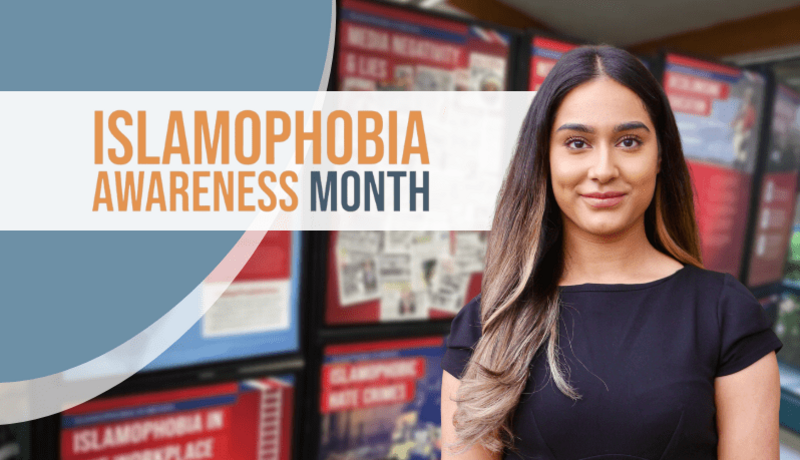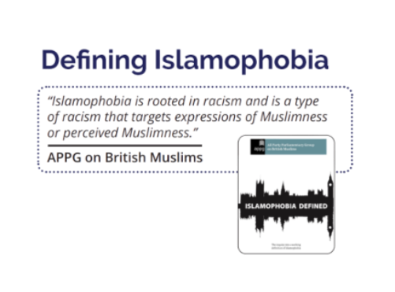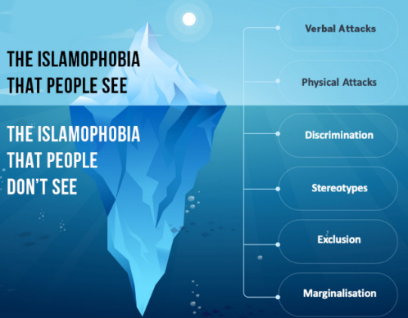Islamophobia Awareness Month | Taran Ruprai
Posted on November 2022

Taran Ruprai, our Diversity, Inclusion & Engagement Associate, shares her experience attending Islamophobia: The Causes and Cures.
For Islamophobia Awareness Month, I attended the LTU Islamic Society event, Islamophobia: The Causes and Cures, to become informed on the subject and discover what we could do at Venn Group to support our Muslim employees and community. The event featured a panel of Muslim academics and students, joined by a not-for-profit organisation, Muslim Engagement and Development (MEND), to discuss issues around islamophobia, microaggressions and Muslim identity.
Islamophobia is prejudice against Muslims or anyone who appears to be a Muslim. This is rooted in a negative view of Islam and can be expressed in a number of ways beyond verbal and physical attacks, such as exclusion, discrimination and stereotyping. I was particularly struck by the fact that the tragic events of 9/11 were a watershed moment in many of the speakers’ lives; that day significantly re-wrote the public perception of the Muslim community, casting Islam as an extremist religion in the media. Currently, for every moderate Muslim mentioned in the press, there are twenty-one references to extremist Muslims. Another cause for islamophobia is the lack of proper understanding and education on the Muslim faith.

As I listened, I was shocked to realise that I had also experienced islamophobia. I’ve been a victim of racism from the age of eleven, whether because of my heritage or the way I look, which has felt horrible. What I hadn’t realised until now is that the derogatory words used were often a result of the individual assuming I was Muslim based on how I look. Their response to hearing that I’m Sikh has been: ‘Oh, but I like Sikhs’. It really is shocking; if I were a Muslim, why would it matter?
I learned through the MEND workshop that in 2020/21 there were 2,703 religious hate crimes against the Muslim community; considering these are only the reported cases, I dread to think what the actual number would be. The majority of the islamophobic attacks are against Muslim women, particularly those who wear the hijab.
The academics found in their research that many Muslims felt they had to hide or ‘tone down’ an element of their identity. One panel member mentioned receiving micro-aggressive comments for wearing his thobe (Muslim religious attire) such as, ‘You must really love your religion.’ He told us, ‘I would think to myself: stop judging me because of what I’m wearing. Yes, I’m religious, but I’m a person too. Please get to know me before making assumptions.’ Another student described going to the pub with a classmate and politely refusing a beer due to not drinking alcohol. When his classmate realised he was a Muslim, he never spoke to him again.

There is currently a lot of conversation around the World Cup in Qatar as it’s the first time it’s being hosted in a Muslim country. There is a danger that the very serious issues around human rights in the country could be portrayed as an issue with Islam as a whole, ignoring the complex political and cultural dimensions involved.
As a result of this event, I will be bringing Islamophobia into our D&I training, covering what it is and how it affects people on a daily basis. This will give our staff the knowledge they need to address any incidents of islamophobia in the workplace and ensure our Muslim colleagues feel comfortable expressing every part of their identity. For 2023, I’m planning a visit from MEND to our regional offices to share their Islamophobia Awareness exhibition. It will give everyone a chance to both learn about the contributions made by the Muslim community to our society and to see the harsh reality of the hate crimes, workplace islamophobia and many other challenges they face.
Combating any form of discrimination requires uprooting deep-seated, mis-held perceptions, but through intentional conversation and education, we can ensure that we see positive change take place.
Click here for a digital tour of the Islamophobia Awareness Month exhibition.
Recent Articles
-
Flipping the Script on Islamophobia | Personal perspective | Nadia Muzaffar
Conversation is a powerful tool. Even a two-minute chat can change a perception, correct a misco...
about 1 month ago -
Pancreatic Cancer Awareness Month | Personal Perspective | Louise Francis
This year, our Birmingham office chose to fundraise for Pancreatic Cancer UK in support of my br...
about 2 months ago -
Personal Perspective| Islamophobia Awareness Month with Safiyyah Ayaz
For Islamophobia Awareness Month, we are honoured to feature passionate employees who have chosen...
about 2 months ago